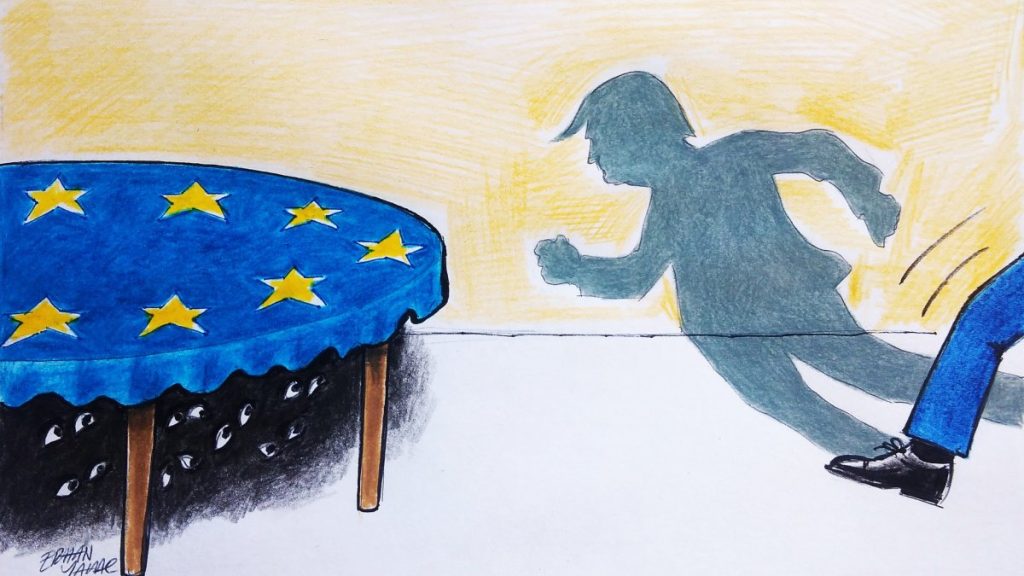Since 2022, European countries have been under fire in the shadow of the Russian-Ukrainian war. Devastating war comes with forced migration, political instability and energy crises – in other words, a vicious circle of social, economic and political catastrophe loops through the streets of Europe. After this unexpected turmoil in the region, interestingly, Donald Trump’s victory in the United States presidential election has created both frustration and high expectations in fragile Europe. While Europe was preparing for the inauguration, the German government lost its vote of confidence, and France and Austria are trying to handle current political crises. In this respect, what should the European political atmosphere expect in 2025?
Every man for himself
The main determinant in Europe’s future will be Trump’s policies on the Russian-Ukrainian war. As known, Trump has stated that he and Russian President Vladimir Putin would meet, although the Republicans have not provided a potential date for the two leaders’ conversation. Here is the question: Which peace and how? The answers to these questions pose various scenarios for the prospects of peace, depending on the parameters of any agreement. Regardless of this debate, there is no doubt Trump will find an already divided Europe, penetrated by Trump’s unpredictable and sharp approach to foreign dealings, which causes alarm. His predilection for bilateral accords risks undermining European unity as various member states compete for favors from the White House. While individual states ideologically associated with Trump, such as Hungary and Italy, may seek deeper connections, other European countries seem to be in a wait-and-see policy. In addition to this, Europe will take its part in Trump’s economic policies based on “America First,” which will result in increasing tariffs and rivalry in specific sectors. In other words, when Trump returns to the White House, it will likely be a moment of recalibration rather than a rupture or continuity in the transatlantic partnership.
Not only has Trump’s influence been felt, but Europe has also suffered from its own instability stemming from individual states. Let’s take a look at four European countries currently facing political instability.
Germany
Almost three years ago, Chancellor Olaf Scholz found himself trapped in the Russian-Ukrainian war while Germany experienced the rise of the Alternative for Germany (AfD), an anti-migrant far-right party. Through the war, Germany became the most vulnerable country due to its energy dependency. As a major consequence, the German economic miracle, which was built on cheap energy and a labor force, started to dismantle. The Russian-Ukrainian war reminded Germany that its army was too weak to respond to any attack by Russia or any other threat. At the end of the day, Germans had to buy expensive but inadequate LNG from the U.S. and try to save the world with a feminist foreign policy. As a result, just before Christmas, the Scholz government lost a confidence vote, and the Bundestag decided to go to an early election in February 2025. There is an expectation that the center-right Christian Democratic Union (CDU) and its Bavarian sister party, the Christian Social Union (CSU), will maintain their lead in the polls. At the same time, the far-right AfD is the country’s second-largest opposition.
Austria
The far-right Freedom Party (FPÖ) won the 2024 general election with 29% of the vote, becoming the dominant party for the first time since World War II. Since then, coalition talks have been blurred in Austria under the shadow of protests. However, President Alexander Van der Bellen gave former Chancellor Karl Nehammer the first chance to form a new government after Nehammer’s party said it would not go into government with the Freedom Party under Herbert Kickl, and others refused to work with the Freedom Party at all. Those efforts to form a governing alliance without the far-right collapsed in the first few days of the new year, and Nehammer announced his resignation. In 2025, Austria will begin a new task for far-right leader Kickl to form a coalition. If he succeeds, it will be the first country led by a far-right leader in Europe, unfortunately, which has the potential to create a positive image and normalize far-right leadership in the region.
France
The last few years were not bright for France and President Emmanuel Macron, as they were filled with protests, from the yellow vests to farmers. Following a crushing defeat of his centrist Ensemble (“Together”) Movement in the June 2024 European Parliament elections, Macron opted to call hasty parliamentary elections to try to settle the domestic political situation. Macron’s expectation that French voters would reward him with a new majority ended in disappointment because of the rising cost of living, the worsening of public services, more immigration and unrest in Europe’s immediate neighboring countries, such as Ukraine and the Middle East. Likely, like Germany, France’s prime minister lost a vote of confidence just before the new year, which led to fresh uncertainty in French politics, perpetuated by Macron’s failed foreign policy maneuvers.
Belgium
Belgium has been surviving without a government since the 2024 general elections. The Belgian elections offered the far-right Vlaams Belang a new chance to become Belgium’s largest party. For months, Bart De Wever has attempted to form a government with five parties: the right-wing nationalist New Flemish Alliance (of which he is chair), the francophone center-right Reformist Movement, the francophone centrist Les Engages, the centrist Christian Democrat and Flemish Party, and the center-left Flemish Forward party. During coalition talks, Belgium’s most important EU tasks couldn’t be fully realized, and it is still on the waiting list.
Domestic issues, as well as geopolitical changes led by Trump’s presidency, pose challenges ahead. Perhaps European capitals should have a late wake-up call, realizing that the world is not only changing but transforming, while their capability to contribute to this transformation is entrapped by old imperialistic rhetoric compounded by strategic blindness.


